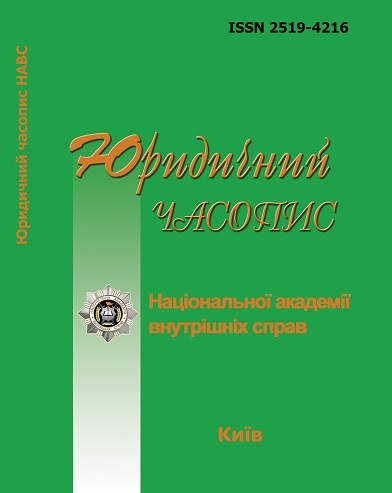Carrying Out of Operational-Search Activity Using Legal Means of Cognitive Activity of the Investigator
Abstract
According of 1960, the Ukraine Code of Criminal Procedure, operational-search operations could be carried out within the framework of the pre-trial investigation initiated, and for the Ukraine Code of Criminal Procedure in 2012, such actions during the investigation are prohibited. In this regard, in the practice of pre-trial investigation and judicial consideration, there are problematic situations related to the admissibility of data obtained as a result of operative-search activities prior to entering information into the United Register of Pre-trial Investigations as evidence in criminal the proceedings. Such situations in court activities are not the same.
The investigation of such situations in the article is carried out on the example of the decision of the court of cassation on the legality of the recognition of evidence of controlled and operational procurement of goods, objects and substances, including those forbidden for circulation, from individuals and legal entities, regardless of ownership, in order to identify and document the facts of unlawful acts., carried out within the framework of the operational investigation to the introduction of information to the United Register of Pre-trial Investigations, and the control of the commission of a crime in the form of controlled and operational procurement in
a criminal prosecution proceedings.
Based on the research, the following conclusions were made: the nature of the actual data obtained from the results of the controlled and operational procurement of goods, objects and substances, including those forbidden for circulation, from individuals and legal entities, regardless of the form of ownership, in order to identify and document the facts of unlawful acts, carried out within the framework of the OSAs before the introduction of information to the United Register of Pre-trial Investigations, and the control of the commission of a crime in the form of controlled and operational procurement in criminal proceedings, is the same if at least two conditions: purchases made under OSAs, wound up in connection with the receipt to the operational unit of primary information about preparing to commit a crime or the person who prepares the offense; Procurement carried out in accordance with the procedure provided for by the Criminal Procedure Code of Ukraine; the actual data obtained as a result of a controlled and operational procurement prior to the submission of information to the IDRD, meet the requirements for the admissibility of evidence in accordance with the content of Art. 86 Criminal Procedure Code of Ukraine, if they were received in the manner prescribed by the Criminal Procedure Code of Ukraine; The prosecutor’s decision to control the commission of a crime is part of the procedure established by the Criminal Procedure Code of Ukraine to obtain evidence (Part 4 of Art. 246 of the Criminal Procedure Code of Ukraine, Art. 251, 271 of the Criminal Procedure Code of Ukraine). The decision in which he issues his decision has features. In particular, the name of the criminal proceedings and its registration number can not be objectively indicated in it, since information about the crime at this stage has not yet been made to the United Register of Pre-trial Investigations; the results of operative-search activity carried out with the use of legal means of cognitive activity of the investigator, can be used in criminal proceedings as evidence provided that the operative-search activities is executed in accordance with the rules defined in the Criminal Procedure Code of Ukraine. The operative-search activities under current legislation can only be carried out in respect of criminal offenses that are being prepared or concerning persons who prepare them.
Downloads
Abstract views: 105 PDF Downloads: 762
Copyright (c) 2018 Law Magazine of the National Academy of Internal Affairs

This work is licensed under a Creative Commons Attribution-NonCommercial-NoDerivatives 4.0 International License.
- Authors reserve the right to authorship of their own work and transfer to the magazine the right of the first publication of this work under the terms of the Creative Commons Attribution License, which allows other persons to freely distribute published work with mandatory reference to authors of the original work and the first publication of an article in this magazine.
- Authors have the right to enter into separate additional agreements on non-exclusive dissemination of the work in the form in which it was published in the journal (for example, to post an article in the institution's repository or to publish as part of a monograph), provided that the link to the first publication of the work in this journal is maintained.
- The journal's policy allows and encourages the posting of articles by authors on the Internet (for example, in electronic storehouses of institutions or on personal websites), both before the submission of this manuscript to the editorial office and during its editorial processing, as this contributes to the creation of a productive scientific discussion and positively affects the efficiency and dynamics of citing the published work.




